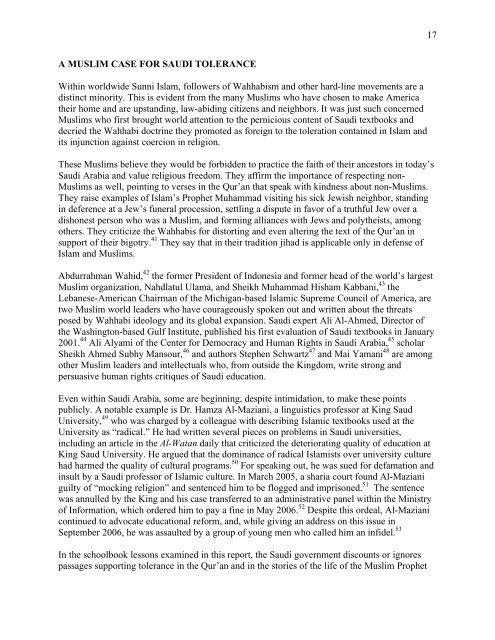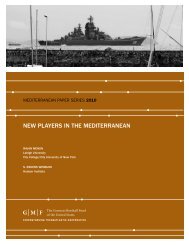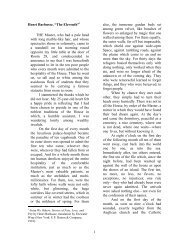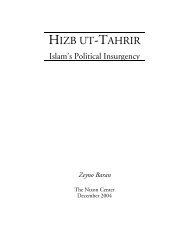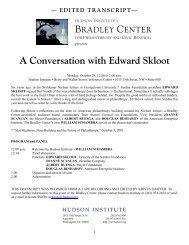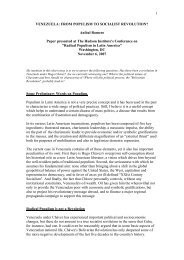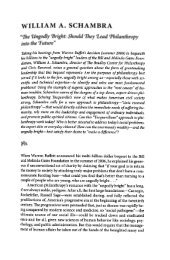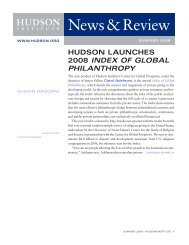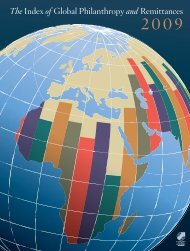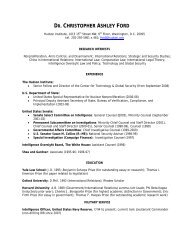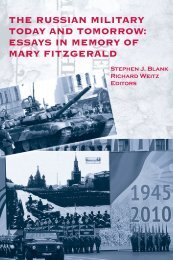Saudi Arabia's Curriculum of Intolerance - Hudson Institute
Saudi Arabia's Curriculum of Intolerance - Hudson Institute
Saudi Arabia's Curriculum of Intolerance - Hudson Institute
Create successful ePaper yourself
Turn your PDF publications into a flip-book with our unique Google optimized e-Paper software.
17<br />
A MUSLIM CASE FOR SAUDI TOLERANCE<br />
Within worldwide Sunni Islam, followers <strong>of</strong> Wahhabism and other hard-line movements are a<br />
distinct minority. This is evident from the many Muslims who have chosen to make America<br />
their home and are upstanding, law-abiding citizens and neighbors. It was just such concerned<br />
Muslims who first brought world attention to the pernicious content <strong>of</strong> <strong>Saudi</strong> textbooks and<br />
decried the Wahhabi doctrine they promoted as foreign to the toleration contained in Islam and<br />
its injunction against coercion in religion.<br />
These Muslims believe they would be forbidden to practice the faith <strong>of</strong> their ancestors in today’s<br />
<strong>Saudi</strong> Arabia and value religious freedom. They affirm the importance <strong>of</strong> respecting non-<br />
Muslims as well, pointing to verses in the Qur’an that speak with kindness about non-Muslims.<br />
They raise examples <strong>of</strong> Islam’s Prophet Muhammad visiting his sick Jewish neighbor, standing<br />
in deference at a Jew’s funeral procession, settling a dispute in favor <strong>of</strong> a truthful Jew over a<br />
dishonest person who was a Muslim, and forming alliances with Jews and polytheists, among<br />
others. They criticize the Wahhabis for distorting and even altering the text <strong>of</strong> the Qur’an in<br />
support <strong>of</strong> their bigotry. 41 They say that in their tradition jihad is applicable only in defense <strong>of</strong><br />
Islam and Muslims.<br />
Abdurrahman Wahid, 42 the former President <strong>of</strong> Indonesia and former head <strong>of</strong> the world’s largest<br />
Muslim organization, Nahdlatul Ulama, and Sheikh Muhammad Hisham Kabbani, 43 the<br />
Lebanese-American Chairman <strong>of</strong> the Michigan-based Islamic Supreme Council <strong>of</strong> America, are<br />
two Muslim world leaders who have courageously spoken out and written about the threats<br />
posed by Wahhabi ideology and its global expansion. <strong>Saudi</strong> expert Ali Al-Ahmed, Director <strong>of</strong><br />
the Washington-based Gulf <strong>Institute</strong>, published his first evaluation <strong>of</strong> <strong>Saudi</strong> textbooks in January<br />
2001. 44 Ali Alyami <strong>of</strong> the Center for Democracy and Human Rights in <strong>Saudi</strong> Arabia, 45 scholar<br />
Sheikh Ahmed Subhy Mansour, 46 and authors Stephen Schwartz 47 and Mai Yamani 48 are among<br />
other Muslim leaders and intellectuals who, from outside the Kingdom, write strong and<br />
persuasive human rights critiques <strong>of</strong> <strong>Saudi</strong> education.<br />
Even within <strong>Saudi</strong> Arabia, some are beginning, despite intimidation, to make these points<br />
publicly. A notable example is Dr. Hamza Al-Maziani, a linguistics pr<strong>of</strong>essor at King Saud<br />
University, 49 who was charged by a colleague with describing Islamic textbooks used at the<br />
University as “radical.” He had written several pieces on problems in <strong>Saudi</strong> universities,<br />
including an article in the Al-Watan daily that criticized the deteriorating quality <strong>of</strong> education at<br />
King Saud University. He argued that the dominance <strong>of</strong> radical Islamists over university culture<br />
had harmed the quality <strong>of</strong> cultural programs. 50 For speaking out, he was sued for defamation and<br />
insult by a <strong>Saudi</strong> pr<strong>of</strong>essor <strong>of</strong> Islamic culture. In March 2005, a sharia court found Al-Maziani<br />
guilty <strong>of</strong> “mocking religion” and sentenced him to be flogged and imprisoned. 51 The sentence<br />
was annulled by the King and his case transferred to an administrative panel within the Ministry<br />
<strong>of</strong> Information, which ordered him to pay a fine in May 2006. 52 Despite this ordeal, Al-Maziani<br />
continued to advocate educational reform, and, while giving an address on this issue in<br />
September 2006, he was assaulted by a group <strong>of</strong> young men who called him an infidel. 53<br />
In the schoolbook lessons examined in this report, the <strong>Saudi</strong> government discounts or ignores<br />
passages supporting tolerance in the Qur’an and in the stories <strong>of</strong> the life <strong>of</strong> the Muslim Prophet


